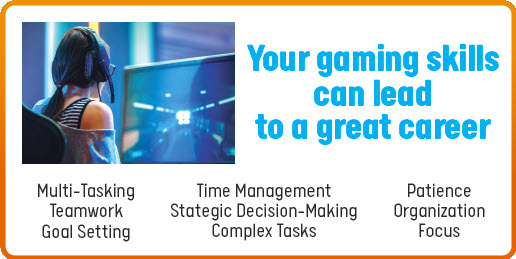How Can Games Transfer to My First Job?
 Call of Duty, Fortnite, Overwatch, Hades, World of Warcraft, Civilization. Have you spent hours of your days and nights dedicated to fulfilling objectives, expanding empires, or trying to get that new character skin? The skills you learn and utilize through playing these video games can be transferred to use in your job search journey.
Call of Duty, Fortnite, Overwatch, Hades, World of Warcraft, Civilization. Have you spent hours of your days and nights dedicated to fulfilling objectives, expanding empires, or trying to get that new character skin? The skills you learn and utilize through playing these video games can be transferred to use in your job search journey.
Think of what you do when you’re working towards finishing a quest or objective in a game. You see where you need to go, how to get there, by what means, what you need to have to complete the objective, and what you might need in case a pack of goblins ambushes you. That’s exactly what you do in a professional setting except the goblins are metaphorical. Perhaps something breaks in the workplace, or a co-worker took off last minute during a busy time. The experience you have in looking at situations and goals objectively can help you deal with issues quickly. Instead of taking this path, we need to adapt and take the one right next to it or maybe instead of focusing on objective A right now we should focus on objective B until we have all the correct gear for A.
Here are some of the skills identified by business leaders in Medina County needed in jobs that gamers bring to the table.
Complex Tasks – In games, there are always things to do. And then there are side things to do. And through it all is generally a story that is building. Add to that while you are trying to do one thing, you are being attacked by others. All of that equals a series of complex tasks that are generally not do one thing and move on to the next. Companies love employees who can handle multiple phases to a challenge and work through all the different parts of a task. Be sure to explain gaming mechanics that way.
Focus while Multi-Tasking – You always have to keep in mind what you are trying to achieve in your game but at the same time there are other priorities you have to manage. For example, if you are trying to finish a quest chain, you have to accomplish each step in the chain. But while that is going on, other creatures are attacking, and other tasks may pop up. So you have to stay focused on your goal, but also manage the other tasks that come with it and come up as you go.
Goal Setting – In any game, you have to set your own goals. What objectives will you pursue, what areas of the game do you want to be in, and how do you want to interact with other players. The ability to set goals and manage multiple goals can be very helpful in a business setting so sharing a story about a situation where you had to set goals and make decisions can help employers see the value.
Organization – Most games try to help with organization of tasks, but it is still something you really have to handle. Being organized when you game often involves organizing your screen, technology, and time to meet your goals. It may also mean organizing a group of people to accomplish a task. These people may be friends but may also be complete strangers. The organization may happen via voice, but it is just as likely you have to get the group together on task through a chat window. COVID showed companies just exactly how important these skills are but may not realize these are things you learn in gaming.
Patience – Gamers aren’t known widely as a patient group, but the truth is you do demonstrate patience when it comes to achieving goals and waiting on upgrades. Helping companies see examples of times you had to be patient and wait for something you wanted can help change their perception of who you are and what you bring to the table.
Strategic Decision Making – Many hobbies require you to make decisions. But in gaming, the decisions are more strategic than in other realms. A decision to take and do one quest when you could have stacked them, a decision to join a particular pick up group vs. another, or the choice to join a raid group or not can have impacts on future game play, time available for other parts of your life, and the types of rewards you earn.
Teamwork – Never before have companies been more ready to understand the skills gamers bring to the table. The perception of gamers is they are solitary but most gamers are part of groups, guilds, and teams. Those groups are not only social, but also work together to accomplish goals. In most games, players also have the option to join pick up groups and have to work with total strangers to accomplish a goal. And as mentioned above, all of the goal achievement is done through electronic means. Understanding how technology works in those situations, good uses of technology, and general protocols go along way in helping companies understand the value of your gaming experience.
Time Management – Another misperception of gamers is they don’t manage their time. But in reality, while there are extreme examples of people not managing their time, the majority have to balance outside influences to the time needed to accomplish goals in game. Be sure you own that to help companies understand your strengths.
